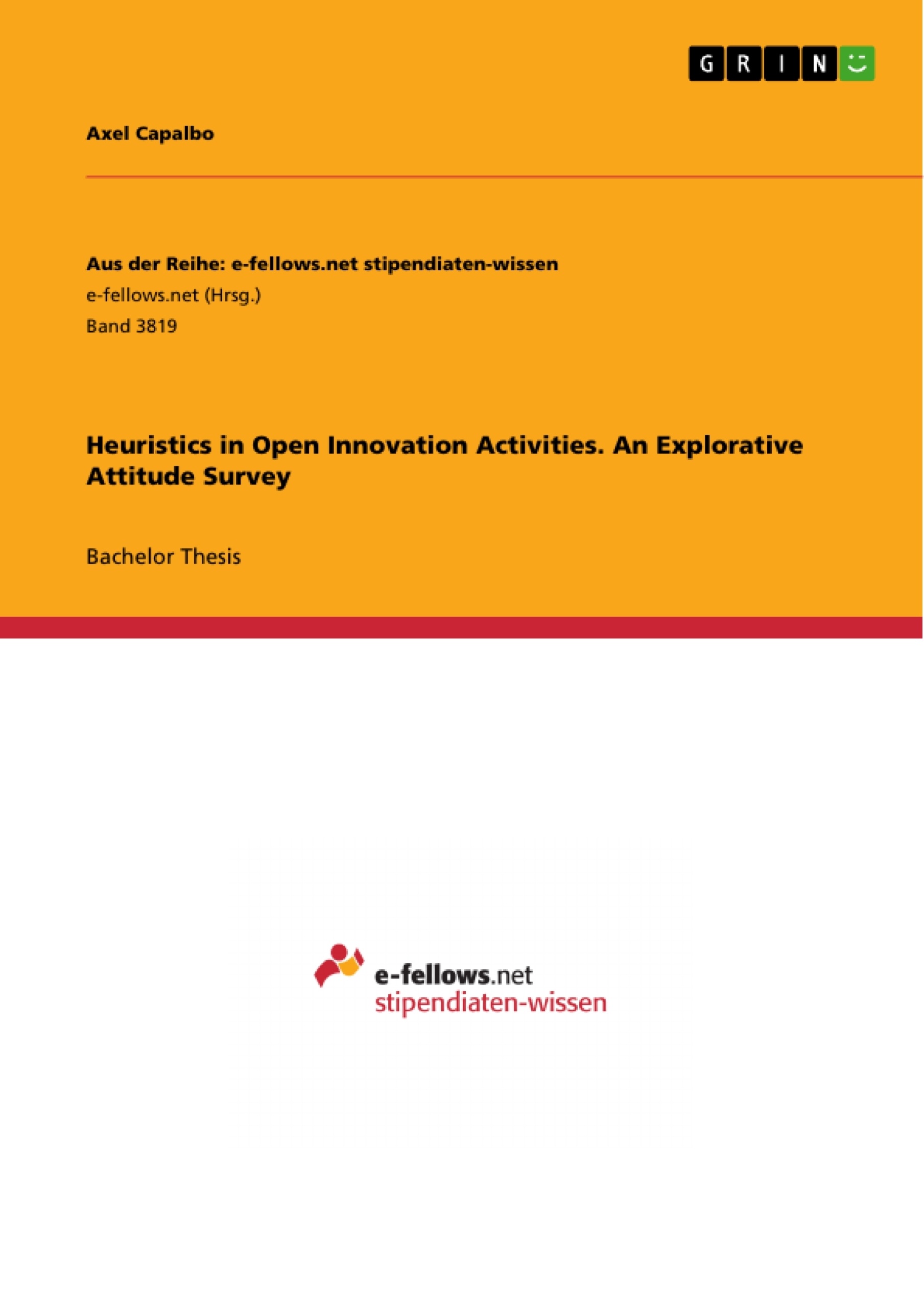In contemporary innovation management, companies increasingly dissolve their internal boundaries to leverage potentials from the outside world by creating synergies for the development of new technical solutions, for example through the reception of key incentives provided by lead users. Such processes of open innovation have remained relatively unexplored from the part of various authors and their theories on problem-solving. One such example serving as the basis for this thesis is the adaptive toolbox by Gerd Gigerenzer, focusing on individual behaviour under limited knowledge in a certain environment and cognitive mechanisms called heuristics, used daily by human beings to avoid or overcome complications.
In this context, the centrepiece of this work is the answer to the question of which heuristics do individuals deploy in an open innovation environment and how these techniques can be categorized. Therefore, a qualitative attitude survey was realized for the accomplishment of this task, what additionally involved the conduction of semi-structured interviews at the FabLab laboratory for open innovation and an extensive content analysis afterwards.
In terms of the results, five different approaches were detected in the given setting and specifically classified according to the individual motives mentioned by the subjects from the sample. In addition, the categories “heuristic” and “frequency” support the categorization by allowing a listing and a preliminary quantification of the heuristics.
Inhaltsverzeichnis (Table of Contents)
- 1. Introduction
- 1.1 The adaptive toolbox
- 1.2 Motivation
- 1.3 Outline
- 2. Background
- 2.1 Open laboratories and open innovation activities
- 2.2 The adaptive toolbox
- 2.3 Assignment of the concept to visions of rationality
- 3. Methodological approach
- 3.1 The research question
- 3.2 Formalised research design
- 4. Results of the data analysis
- 4.1 Profiling of the sample
- 4.2 Evaluation of the environment
- 4.3 Classification of the heuristics
- 5. Discussion - the significance of this explorative attitude survey
- 5.1 Limitations
- 5.2 Opportunities for future research
- References
Zielsetzung und Themenschwerpunkte (Objectives and Key Themes)
This thesis aims to explore the use of heuristics in open innovation environments. It specifically investigates which heuristics individuals employ in such settings and how these techniques can be categorized. The work draws on the adaptive toolbox concept, a framework that examines human behaviour under limited knowledge and explores the cognitive mechanisms known as heuristics.
- The role of heuristics in open innovation
- Categorization of heuristics used in open innovation
- The adaptive toolbox as a framework for understanding heuristic use
- The application of qualitative methods in researching open innovation
- The implications of the findings for future research and practice in open innovation
Zusammenfassung der Kapitel (Chapter Summaries)
The introduction presents the adaptive toolbox concept and its relevance to understanding open innovation activities. It outlines the motivation for the research and the structure of the thesis. Chapter 2 delves into the background of open laboratories and open innovation activities, providing an overview of the concept of open innovation. The adaptive toolbox is discussed in detail, highlighting its core principles and its application to problem-solving. The chapter concludes by examining the assignment of the adaptive toolbox concept to different visions of rationality. Chapter 3 focuses on the methodological approach taken in the research. It presents the research question and details the formalized research design, including the use of a qualitative attitude survey and semi-structured interviews. The results of the data analysis are presented in Chapter 4. The chapter examines the profiling of the sample, the evaluation of the environment, and the classification of the heuristics identified through the research.
Schlüsselwörter (Keywords)
The primary keywords and concepts explored in this thesis include open innovation, heuristics, the adaptive toolbox, qualitative research methods, attitude survey, semi-structured interviews, and content analysis. These terms represent the core themes and research foci of the work, aiming to shed light on the cognitive processes and tools employed by individuals navigating open innovation environments.
Frequently Asked Questions
What are heuristics in the context of innovation?
Heuristics are simple cognitive mechanisms or "mental shortcuts" used by individuals to solve complex problems under conditions of limited knowledge and time.
What is Gerd Gigerenzer’s "adaptive toolbox"?
The adaptive toolbox is a theoretical framework that describes the collection of heuristics humans use to navigate specific environments effectively.
How do heuristics apply to Open Innovation?
In open innovation environments like FabLabs, individuals use heuristics to manage synergies with external partners and develop new technical solutions quickly.
What were the results of the explorative attitude survey?
The study identified five different approaches to problem-solving in open innovation settings, classified by individual motives and frequency of use.
What research methods were used in this thesis?
The author used a qualitative approach involving semi-structured interviews at a FabLab and an extensive content analysis of the data.
- Quote paper
- Axel Capalbo (Author), 2016, Heuristics in Open Innovation Activities. An Explorative Attitude Survey, Munich, GRIN Verlag, https://www.grin.com/document/1010166



